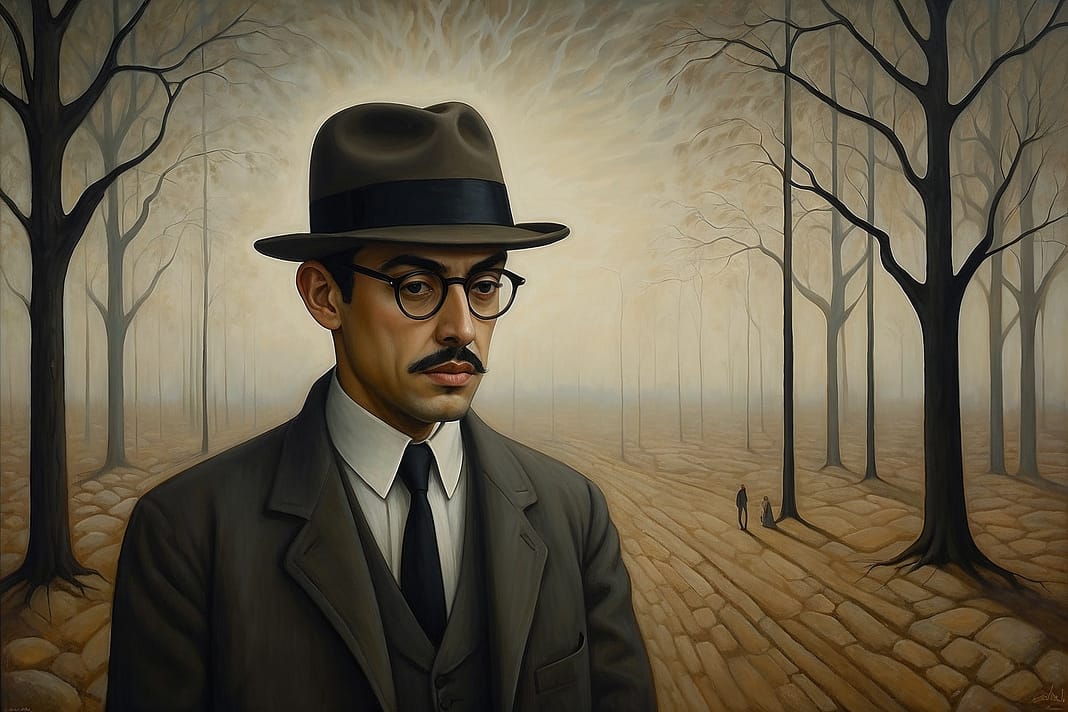There are books that rattle us with their weight, and there are books that whisper to us from the depths of quiet corners, and it is there, in those spaces, that we confront ourselves. The Book of Disquiet, written by Fernando Pessoa and voiced through his semi-heteronym Bernardo Soares, is such a book—a slow, quiet storm where pages turn with the breath of an insomniac’s thoughts, curling inward on themselves, revealing the contours of solitude, despair, and fragile beauty.
In the space of this book, one does not expect answers, nor conclusions. This is no story with a beginning and an end. Instead, it is a window into an eternal loop of thought—fragmented, disordered, like the broken pieces of a mind struggling to make sense of existence. Pessoa’s Lisbon becomes a backdrop not for grand adventures but for quiet reckonings with the self. Soares, an assistant bookkeeper who lives in obscurity, leads us not into the heart of the city, but into the corridors of his mind, where loneliness stretches like long shadows, bending beneath the weight of memory and disillusionment.
There is a question that hovers around this book: What exactly is the disquiet that Soares speaks of? Perhaps it is the restlessness that simmers beneath the surface of our everyday lives. It’s the quiet gnawing that comes in the stillness of dawn when all the noise of the world has fallen away and we are left only with ourselves. It is the awareness of time slipping, the awareness that all is fleeting. That our days pass in routine, and yet inside, something is always unspoken, unsatisfied.
Pessoa never meant for us to leave this book whole, and it doesn’t let us. The Book of Disquiet reflects the profound sense of alienation that Soares feels, and we, as readers, too, feel that dissonance within us. He speaks of life as an endless repetition—”I’ve lived long enough to see everything repeat itself in endless cycles that never stop repeating.” We watch him recount the dull ache of existence, the weight of not knowing how to live authentically in a world that insists on moving around him. His inner life becomes a sanctuary and a prison, where he retreats into dreams, because dreams are safer than the world that lies beyond them.
This leads us to another question: What does it mean to retreat from the world into the self? Is it an act of cowardice, or is it survival? Soares’s retreat is not the retreat of a man who has given up. It is the retreat of someone who seeks refuge in the only space where control is possible: the imagination. Reality may offer little comfort, but within the walls of his mind, he can conjure a world that is both more tender and more terrifying than what lies beyond. He speaks not with bitterness but with a melancholic acceptance. “Life is whatever we imagine it to be,” he writes, and that alone is enough to sustain him, though only just.
To engage with Pessoa is to engage with the tradition of existential inquiry—though he wrote before Sartre and Camus would define that philosophy, his work lives in its territory. Yet where those thinkers spoke in terms of revolt and rebellion against the absurdity of life, Pessoa finds solace in resignation. There is no fight left in Soares, only the quiet acknowledgment that life is a thing to be observed from a distance. “I am nothing. I shall always be nothing. I cannot wish to be anything.” It is a confession that brings with it not despair, but a strange peace. For to realize one is nothing is to be freed from the weight of becoming something.
And yet, there is beauty in the despair. Pessoa’s prose is poetry in disguise, lyrical and mournful, brushing up against the edges of language with a grace that cuts deep. There are moments when Soares describes the world around him—rain on a window, the way light shifts across a street at dusk—and in those moments, the disquiet pauses. There is a fleeting sense of connection, a recognition that while life may be absurd, there are pieces of it that shimmer, even if only for an instant. And in those moments, the book speaks to something tender and unspeakably human: the desire to find beauty even in the face of unrelenting disillusionment.
This brings us to one of the more pressing questions trending today: Is there hope in the disquiet? The answer depends on what we mean by hope. There is no hope in the traditional sense—no redemption, no triumph over despair. But there is hope in the act of bearing witness. Soares bears witness to his own suffering, his own doubts, and that in itself is an act of defiance. To be disquieted is to be alive, to feel the pulse of one’s own consciousness even when that pulse is steady and slow, weighed down by the inevitability of time.
Pessoa’s creation of Soares, this “semi-heteronym,” raises another critical question: What is the relationship between Pessoa and Soares? This question echoes through every page, as Soares becomes not just a character, but an extension of Pessoa’s own fragmented self. Pessoa, who famously created multiple heteronyms—distinct literary identities with their own voices and philosophies—gives us Soares as a mirror of his inner life. But Soares is not Pessoa; he is a shadow, a fragment of the larger whole. And this, too, is a reflection of the disquiet: the idea that identity itself is never whole, that we are always many things at once, shifting, incomplete.
So, what are we left with at the end of The Book of Disquiet? We are left with questions. Pessoa does not write to resolve our uncertainties. He writes to hold them up to the light, to let them shimmer in their incompleteness. And in that act, he offers us something far more powerful than answers: He offers us the permission to dwell in our own disquiet, to accept that perhaps we are not meant to understand life, but merely to witness it—to feel it, however fragmented and chaotic it may be.
In the end, we are reminded that to be disquieted is not to be broken, but to be awake. And as Soares whispers to us through the pages, we cannot help but listen. Even in his silence, there is something that resonates, something that lingers in the spaces between his words—a quiet, aching truth about what it means to be human.
Discover more from The Reasoned Journey
Subscribe to get the latest posts sent to your email.


